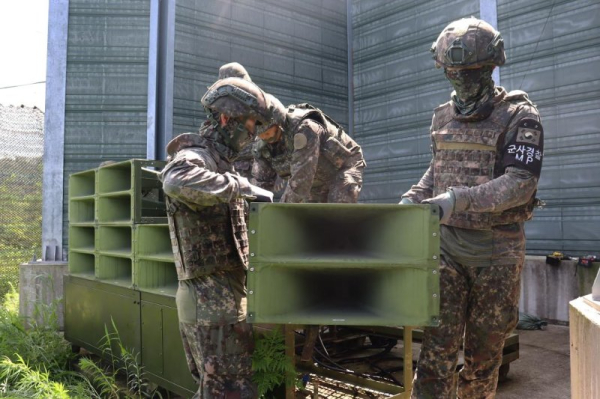

1 of 2 | South Korea’s military began removing anti-Pyongyang propaganda loudspeakers along the DMZ, the Defense Ministry said Monday. Photo courtesy of South Korea Ministry of Defense
The South Korean military on Monday began removing loudspeakers that had been installed along the DMZ to blast anti-Pyongyang messages across the border, Seoul’s Defense Ministry said.
“This is a practical measure that will help ease tensions between the South and the North, as long as it does not affect the military’s readiness posture,” the ministry said in a text message sent to reporters.
In June, South Korean President Lee Jae Myung ordered the suspension of the broadcasts, which included news, K-pop music, and information about democracy and life in South Korea.
The removal of the speakers was a follow-up to the June suspension and is expected to be completed this week, ministry spokesman Col. Lee Kyung-ho said at a press briefing.
“There was no prior consultation with North Korea,” Lee added.
The move comes roughly a year after Seoul had resumed Cold War-style propaganda broadcasts in response to a series of provocations by North Korea that included floating thousands of trash-filled balloons across the border.
The North countered by broadcasting bizarre noises such as metallic screeching and animal sounds, disturbing residents in areas near the DMZ. Pyongyang quieted its own speakers after the initial suspension but has not yet appeared to take corresponding action to remove them.
“North Korea has been seen repairing some of its loudspeakers, but has not been seen removing them,” Joint Chiefs of Staff spokesman Col. Lee Sung-jun said at the briefing. “Since we’ve already begun the removal process, there haven’t been any other signs of activity from the North Korean military.”
President Lee has made an effort to improve inter-Korean relations since taking office. In addition to the loudspeaker suspension, his administration has also cracked down on activists floating balloons carrying anti-Pyongyang leaflets across the border.
Last month, Seoul repatriated six North Koreans who drifted into southern waters on wooden boats and announced plans to return the remains of another North Korean national found near the maritime border.
North Korea has so far dismissed any notion of reconciliation with Seoul, however. Last week, Kim Yo Jong — the influential sister of North Korean leader Kim Jong Un — said Pyongyang had “no interest” in responding to efforts by the Lee administration to thaw relations, citing Seoul’s “blind trust” in military ties with the United States.